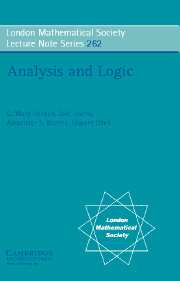Let G be a countable group and X a Borel G-space. Then it is clear that is a Borel equivalence relation and every one of its equivalence class is countable.
Definition 4.1. A Borel equivalence relation E is countable if every equivalence class is countable.
We now have
Theorem 4.2 (Feldman-Moore [77]). The following are equivalent for each Borel equivalence relation E on a Polish space X:
(i) E is countable.
(ii) E = for some countable group G and a Borel G-space X.
Countable Borel equivalence relations have long been studied in ergodic theory and its relationship to the theory of operator algebras. One important observation is that many concepts of ergodic theory such as invariance, quasi-invariance (null set preservation), and ergodicity of measures depend only on the orbit equivalence relation and not the action inducing it. Also a countable Borel equivalence relation with an associated quasi-invariant probability measure gives rise to a canonical von Neumann algebra and this has important implications to classification problems of von Neumann algebras. See, for example, the survey Schmidt [90].
The simplest examples of countable Borel equivalence relations are those induced by Borel actions of the group of integers ℤ, i.e., by the orbits of a single Borel automorphism. These are also called hyperfinite in view of the following result.
Theorem 4.3 (Slaman-Steel [88], Weiss [84]). For each countable Borel equivalence relation E on a Polish space X the following are equivalent:
(i) E =, for some Borel ℤ-space X.
[…]
